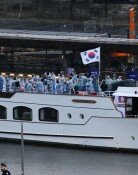[Editorial] Treacherous Retainers behind Absurd Press Reforms
[Editorial] Treacherous Retainers behind Absurd Press Reforms
Posted May. 29, 2007 06:48,
With regard to the closure of briefing rooms, Kim Chang-ho, minister of the Government Information Agency (GIA), said on Monday, The measure wouldnt have been able to be announced if public opinion had been consulted on its specific plans. In other words, Kim practically admitted that the so-called advanced press system was a unilateral action by the government. In order to make the electronic-briefing system take root, it is important for journalists to restrain themselves and limit the number of questions, Kim said last week during a radio program. He seems to believe the convenience of the government is more important than the publics right to know.
Kim, who had worked for a daily newspaper as a reporter, resigned to take an associate professor position in digital media in March 2005. However, three weeks on the new job, he changed positions again upon receiving an offer for the GIA minister position. Since Kim took a leave from the university at which he worked for less than a month, he is concurrently holding both the professor and minister titles. It arouses curiosity that, if he returns to the university, will he teach his students that, as a watchdog for the public, the media must get prior permission to monitor the government and refrain from asking questions?
Yang Jeong-cheol, the presidential secretary for communications who has spearheaded the measure along with Kim, is known as a real power behind Cheong Wa Daes public relations. Kim was the chairman of the Jamintu, an anti-American leftwing organization, and a reporter for his university newspaper and the Union of Media Workers. He also worked in the public relations division of Nasan Group and Hanbo Group, respectively. Yang has been in the vanguard in counter-attacking the media critical of the Roh administration. His corporate sponsorship request for a government event caused controversy and his phone calls to senior officials of broadcasting companies demanding President Rohs statement be live broadcast drew strong criticism. Yangs attitude appears to indicate that he believes the media is the governments propaganda tool.
I was annoyed to receive the same questions by some 30 reporters every morning when I worked as a Cheong Wa Dae spokesperson. Once the electronic briefing system is introduced, (the work of) both the public officials and reporters will be much easier, Yoon Seung-yong, senior presidential secretary for public information, said on last Sunday during a KBS TV program. The presidential secretary, who is paid by the taxpayers money, also appears to believe that comfort is a priority to the publics right to know.
Kim, Yang, and Yoon have driven a wedge between the government and the public by separating the public from the media. Those presidential aides are inflicting wounds to the government and, President Roh, who has appointed and overprotected them, will not be able to deny his responsibility for the damage. The head of the main opposition calls Rohs aides treacherous retainers.







